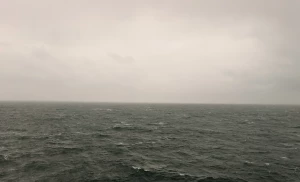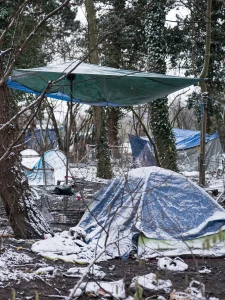Choose Love: why is the charity funder quitting Calais this Christmas?
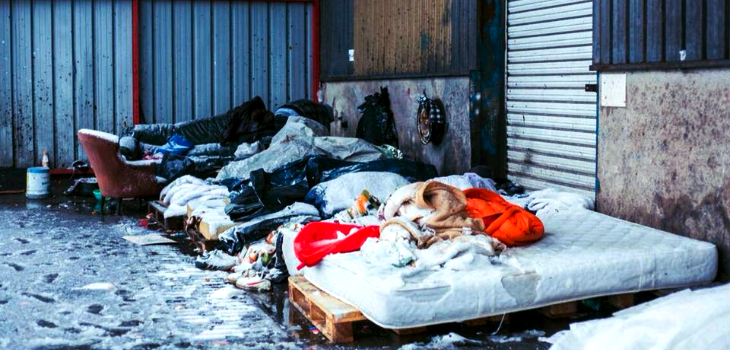
Things will be even more desperate in Calais and Dunkirk this Christmas. Many charities working to support migrants there depend on funding from one organisation: Choose Love. Set up in 2015 by former Coldplay PA Josie Naughton and her friends, Choose Love now raises close to £12 million a year. But now it is cutting its funding to groups in Northern France by the end of the year, except for some work with unaccompanied children.
“This will have a big impact,” one current charity manager in Calais told Corporate Watch. “It means people without tents, without shoes, without wood they need to keep warm. It means less food, charity warehouses shutting, and the organisations that remain focusing on just the most urgent essentials, so less capacity for things like advocacy, legal aid, human rights monitoring.”
No one can argue the need has gone. Tragic deaths at sea are mounting but desperation still brings as many people to try to cross the border. Relentless police harassment on land continues and now winter is hitting hard.
So what is Choose Love, who is behind it – and why are they leaving Calais? To find out, Corporate Watch has spoken to a number of former Choose Love employees, to people who have worked with the organisations it funded, and to others who have been active in Calais charity and solidarity. We have maintained all our sources’ anonymity, at their request.
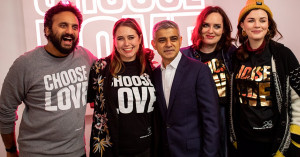
Josie Naughton (2nd left) and some friends. Choose Love publicity photo.
A group of mates meets a group of bankers
Choose Love’s origin story has been well publicised. In August 2015, at the height of the “long summer of migration”, a “group of mates” made a Twitter hashtag #HelpRefugees, asking for donations. They filled a London warehouse with supplies and drove to the Calais Jungle. This was a particularly well-connected group of mates: Josie Naughton worked as PA to the manager of Coldplay, radio DJ Lliana Bird’s partner is comedian Noel Fielding, while Dawn O’Porter was a TV presenter. A year on they had raised “£2 million and another £1 million worth of goods and services, with close to zero overheads”. Naughton had quit her day job to run the operation, then called Help Refugees, assisted by another friend Nico Stevens (now Sanders).
Explaining this overnight success, Naughton has said their “naivety was an asset”, and that working with Coldplay she “learned about how to use branding, speak to a community and run a business.” They certainly had enthusiasm and drive – but then so did many people rushing to help in the Jungle at that point. What others didn’t have were their networks, the ability to pull in big-name celebrity backers and social media influencers.
Less well-known – but just as consequential – is Choose Love’s relationship with an organisation called Prism the Gift Fund. Scroll down to the small print at the bottom of the Choose Love website, and we are told Choose Love is operating “under the auspices of Prism the Gift Fund”. Choose Love is not run as an independent charity but as a “collective fund” managed by Prism, which is itself a charity. Prism says it helps organisations like Choose Love with legal and financial issues, and “back-office support”. Prism says this allows groups like Choose Love to “focus on the cause whilst we provide the administration, governance and charitable expertise to support your charitable endeavours all over the world.”
This underplays the control Prism has over “collective funds” like Choose Love. Prism’s annual report says: “Founders [of Collective Funds] are accountable to Prism in all their activities, and Prism has full control of all financial flows”.
So who is behind Prism? Its CEO is Anna Josse, who also runs the private equity fund Regent Capital, which “specialises in investment products/services to UK-based high net worth investors” (i.e., rich people). She is supported by a board of trustees, most of whom are investment bankers and fund managers, also specialising in “wealth management” for rich clients. The exception is Lord Dolar Popat, a Conservative life peer and former junior government minister.
As well as running “collective funds” like Choose Love, Prism also manages donation funds for rich people, who want to give to charity without the trouble of setting up their own private foundations (while still maintaining the “tax benefits” from charitable giving, naturally).
Josse has done well from the fees Prism charges its clients and funds (in Choose Love’s case, 2% of its expenditure). While Prism’s activities are not for profit, it pays its staff through a private, for profit company: Prism Administration Ltd. This is co-owned by Josse and her fellow Prism co-founder businessman Gideon Lyons. Its accounts show it has made £740,000 in profit in the last four years and has paid out £610,000 to Josse and Lyons in dividends.

Anna Josse (centre) and the Prism team at the “Luxury Briefing Awards 2019”. Photo from Prism social media.
“Defensive and secretive”
With Prism’s support Choose Love grew far beyond its Calais origins. In 2020 it raised £11.8 million and spent £9.7 million. Just over £1 million went on programmes in France, with more than £5 million in Greece, £1 million in the UK, £617,000 in Syria, and smaller amounts in another 13 locations, from Brazil to Bangladesh.
In Calais, Choose Love has supported around 10 “partner” groups. These have included aid distribution organisations like Calais Food Collective and Collective Aid, as well as projects like the Refugee Women’s Centre, Human Rights Observers, Refugee Infobus, or Maison Sesame which provides emergency accommodation. Many of these organisations, like Choose Love itself, were quite recent “start-ups” often created by British volunteers. For this reason, a lot of the funding and administrative infrastructure went through Choose Love’s major French partner, the more established local association L’Auberge des Migrants.
At the start of 2021, Josie Naughton (CEO) and Nico Sanders (deputy CEO) were now rarely seen in Calais. But there was no hint of quitting. Daily operations were run by locally-based French-speaking field managers, and Choose Love was developing a new long-term strategy for its work in the north of France.
Then came two developments, both in February 2021. First, a former Choose Love employee in Greece published allegations that she had been raped by another employee there, and accused Choose Love of failing to adequately investigate or respond. These allegations alarmed a number of the “partner” groups in Calais, who wrote a joint letter to Choose Love.
One former Choose Love employee told Corporate Watch the intention of the letter, and other demands for clarification, was “to stimulate more discussion and accountability”. But instead it “triggered a defensive reaction by top management”:
“They eventually accepted to provide answers to partners on some questions, while maintaining confidentiality on sensitive information about the case. But some people hoped for a larger discussion between Choose Love and partner organisations to learn lessons. They decided not to facilitate this, but instead to opt for a very defensive and secretive approach. This created a lot of frustration and unease amongst partner organisations, who felt like a split emerged between Choose Love and the rest of the Calais network.”
Crossing the line
In the same month, Choose Love bosses in London found out charities they funded were handing out safety information for refugees trying to cross the channel. They were mainly concerned by the “Safety at Sea” leaflets, produced by Watch the Channel. This is a small activist group linked to Calais Migrant Solidarity, the “No Borders” solidarity network which has been active in Calais since 2009, as well as to the Alarm Phone network which runs an emergency phone line for sea rescue in the Mediterranean.
Written in several of the main languages used in Calais, the leaflets give basic lifesaving information such as emergency numbers, how to send GPS coordinates to rescuers, and what to do if your engine breaks down. There are no tips on how to evade police or coastguards, just how to call them in case of shipwreck. The leaflet was checked by both French and British legal experts. It may well have saved some people’s lives.
But according to another person familiar with Choose Love’s approach on this issue:
“Choose Love’s approach and policy on this, was that volunteers from partner organisations were never to give ‘advice’ to refugees in Calais. For example, volunteers could give out emergency coastguard phone numbers, but if people asked anything more than that they should say nothing. Volunteers were also told, specifically, not to help if anyone asked about where to get life jackets. These leaflets were seen as crossing that line.”i
In May, as Calais organisations continued to share the leaflets, Choose Love got tough. It wrote a formal email to its partner associations warning them that distributing the leaflets – or even just “discussing” them – could be “regarded as criminal offences”.ii Organisations were told they had to sign a “Memorandum of Understanding” promising not to “carry out activities which risk breaching the law.”
Why did Choose Love feel the leaflets were so dangerous? The email said this position came following “a general risk review carried out by our host charity, Prism the Gift Fund.” And when Watch the Channel wrote to Choose Love disputing its position, Nico Sanders replied saying they were following legal advice “sourced from [barristers] Garden Court chambers”. Her reply also ended with a blunt statement: “We are unable to fund organisations distributing leaflets of this nature.”
The funded organisations in Calais were not happy. According to people we spoke to, none refused outright to sign the memorandum. But some held off signing, while at least one wrote back to Choose Love protesting. Some started to talk about the issue in public, including L’Auberge des Migrants, Choose Love’s main French partner. Its president François Guennoc publicly defended the leaflets, saying:
“With the other associations, we all agreed about these leaflets. They are legal, we checked this before giving them out. They are documents that save human lives.”
At the start of June, Choose Love and Prism asserted their authority. They told their partners that, from now on, they would only issue funding agreements for a month at a time. People we spoke to saw this as sending a clear message: back down over the leaflets, or lose the money. Then, at the end of June, Choose Love told all their Calais partners that their funding would end in December.
What further enraged many partners is that Choose Love ordered them to keep the news secret: a gag that held until November. The rationale for this, according to a former Choose Love employee, was that publicising the withdrawal from Calais might negatively impact Choose Love’s ongoing fundraising activities. But this meant that the Calais groups faced even greater problems: not only was their funding about to end, but they couldn’t explain their situation to potential new donors.
When we asked Choose Love about this, they told us: “This decision was communicated to partner organisations as early as possible, and grant agreements were in fact extended, to enable those affected to find alternative sources of funding should they require it.”
Also at the end of June, Choose Love axed its London-based “Advocacy” team, which had been set up to work on policy interventions. For the former employees we spoke to, this seemed a clear signal that Choose Love wasn’t just retreating from Calais, but from anything beyond the narrowest definition of humanitarian aid.
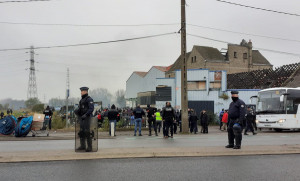
Forced camp evacuation in Grande-Synthe in November. Picture: Utopia 56.
Is it really a crime to help people survive at sea?
Did Choose Love have significant cause to fear legal risks from the sea safety leaflets? It’s hard to see how. Choose Love’s email to partners mentioned a section of immigration law (Section 25) on “facilitating entry”, i.e., helping people enter the country illegally. But there are no cases of this law being used in anything like the situation of handing out a safety leaflet.
Indeed, as the recent acquittal of Iranian refugee Fouad Kakaei shows, even actually steering a boat across the Channel isn’t in itself illegal. If the aim is to claim asylum, people are openly heading to a British port not trying to evade the coast guards, and it’s not being done for financial gain, then this is not “facilitating illegal entry”. It seems even less likely that someone could be successfully prosecuted just for giving out safety information, aiming to save people’s lives. And less likely still that Choose Love or Prism would be prosecuted just because they give unconnected funding to others who give out these leaflets.
Choose Love’s managers have refused to discuss the legal advice they received from Garden Court, citing “legal privilege”.iii They did not answer our questions about this legal advice or how it affected their decision to end funding. It seems possible that Garden Court, as is typical in barristers’ advice, may have identified the theoretical possibility of a prosecution. Which is not the same thing as saying it was at all likely. Ultimately, any legal advice would still leave the responsibility with the clients – Choose Love, or Prism – to decide what level of risk they were willing to face. The answer is apparently: not much at all.
The law may get tougher in future. Responding to the media hysteria about boat crossings, the government’s new Nationality and Borders Bill could potentially criminalise even people trying to reach a port to claim asylum. But there should still remain a defence for people giving out information to try and save lives.
And, of course, this law hasn’t yet been passed. As a group has written on the Oxford University Law Faculty’s Border Criminologies blog:
“Given the hostile agenda at the heart of the Nationality and Borders Bill, caution around criminalisation is understandable. But rather than minimising this chance, the actions of Choose Love risk making it even more likely. Without prompting or legal precedent, they took it upon themselves to define certain forms of support as (potentially) criminal, signaling their own distance from, and disapproval, of this work. This pre-emptive move in effect enforces the border on the UK’s behalf, criminalising particular routes to the UK, and anyone even seen to be supporting those travelling on them.”
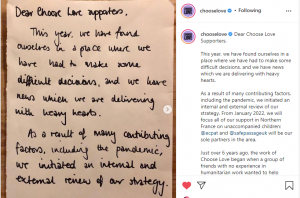
Under pressure?
Choose Love’s only public statement on the decision to leave Calais is a handwritten note posted on Instagram on 2 November. It says: “this year we find ourselves in a place where we have had to make some difficult decisions and we have news which we are delivering with heavy hearts.” But no explanation. Just: “as a result of many contributing factors, including the pandemic, we initiated an internal and external review of our strategy.”
When we asked Choose Love if they could explain further, they sent us a very similar statement: “The decision to end funding for some projects in northern France was not taken lightly. It followed in-depth internal and external reviews into how we carry out our work […]”.iv
Some people in Calais we spoke to believe the Home Office may have deliberately exerted pressure to break Choose Love’s backing for groups supporting migrants there. Boat crossings from Calais have become a central political issue – and massive media headache – for Home Secretary Priti Patel.
Choose Love’s top management was in contact with the Home Office. In February, as the rape allegations and leaflet issues kicked off, Josie Naughton was preparing for a meeting with members of Priti Patel’s policy team about unaccompanied children in Calais. Another possible conduit is Prism’s Tory Lord, Lord Popat. He has worked with Priti Patel before, including on a major trade mission to India in 2013. There were certainly opportunities for ministers or officials to “lean on” Choose Love – but no evidence that this ever happened.
How involved was Prism in the decision to quit Calais? We have already seen it has significant formal power over Choose Love. This appears to have been exercised in practice. One former Choose Love employee told Corporate Watch:
“Prism played a very big role in Choose Love’s decision-making. Prism employees attended many of the Choose Love internal meetings and had a very close relationship with the top management team. After the rape allegation, it was Prism who carried out the investigation on behalf of Choose Love. I think that says a lot about their dynamics.”
Another recalls how:
“when Choose Love announced the funding was being cut, there were hints that they didn’t really want to do this, it was coming from Prism and their hands were tied. Of course all of that was very vague, they never disclosed what the risk review actually concluded.”
We asked both Choose Love and Prism what discussions they had with the Home Office, and whether these had influenced their decision. We also asked both to explain the decision-making relationship between them. Choose Love did not directly answer the question about discussions with the Home Office, but told us:
Our decision was ours and ours alone. All financial decisions are fully audited by Prism the Gift Fund, who oversee Choose Love to provide the highest levels of financial oversight and governance, ensuring we meet the highest regulatory standards, and it is independently audited and fully compliant with the Charity Commission.”
Prism told us:
“Choose Love’s decision to end funding for some projects in northern France was entirely its own decision.” It also said: “We were aware of the decision but our involvement was rightly limited to overseeing the highest standards of financial oversight and governance.”v
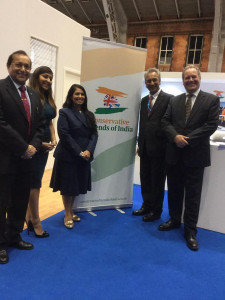
Priti Patel and Lord Dolar Popat, Prism trustee, together at the Conservative Party conference 2015. Patel and Popat are immediately on either side of the banner. Picture: Bob Blackman MP.
Love without commitment
In Calais, Choose Love’s managers faced several pressures. They faced new demands for accountability from their funded organisations; some perceived legal risk, however low; and, possibly, political pressure from the Home Office. We don’t know exactly what factors shaped their decision. What we do know is that, as these pressures mounted, they quit their commitment to Calais.
Perhaps that’s hardly surprising. Choose Love and Prism came to dominate the supply of humanitarian funding to Calais almost overnight. This put considerable power over vulnerable people into the hands of two groups of decision-makers. One was Choose Love: a “group of mates” from the London media world, who openly admitted their “naivety”. The other was Prism: a charity manager for the rich, run by investment bankers and a Conservative Lord.
One person who worked with Choose Love reflects: “my first impression when I realised how they worked was that they were ill prepared, just not competent. But then, there is only a certain amount you can justify as lack of preparedness or poor leadership.”
Maybe it wouldn’t matter so much if all people needed in Calais were deliveries of food and other aid. But Calais has never been just a “humanitarian crisis” – if there is ever such a thing. The desperation and death here is a direct result of the border, created by media and politicians, enforced by police and security guards. When even sharing basic sea safety information becomes a political battleground, showing solidarity means being called to make a stand. If standing with refugees means choosing love, that love also requires commitment.
If you want to send money to Northern France:
Calais Migrant Solidarity / Watch the Channel:
The Calais Migrant Solidarity network has been active in Calais since 2009, practising solidarity not charity. Watch the Channel shares sea safety information and monitors the UK and French authorities “to ensure that the coastguards fulfil their duties under international maritime law to rescue people in distress.” It doesn’t have its own bank account but donations can be sent via CMS.
https://calaismigrantsolidarity.wordpress.com/donate/
Calais Appeal:
Calais Appeal is a group of seven humanitarian aid organisations working in Calais: Calais Food Collective, Collective Aid, Human Rights Observers, Refugee Women’s Centre, Refugee Info Bus, Woodyard and Project Play. They have set up this joint emergency appeal fund after having their funding cut by Choose Love.
https://www.calaisappeal.co.uk/
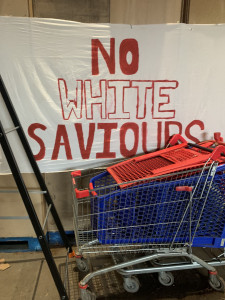
Photo from Refugee Community Kitchen
iThere is a distinction in UK law between giving “immigration advice”, e.g., advising an individual on their specific case, and sharing general “information”. In an email exchange with Choose Love, Watch the Channel pointed this out and asked that Choose Love stop referring to their leaflet as giving “advice”.
ii“We understand that some civil society organisations in Calais may, as of recently, be carrying out activities (such as, non-exhaustively, creating, distributing and discussing leaflets giving advice on making Channel crossings) which might be regarded as criminal offences under section 25 [of the Immigration Act 1971].”
iiiIn an email to Watch the Channel, Nico Sanders of Choose Love wrote: “We can confirm we received legal advice
which we are unable to share in order for it to remain legally privileged.” When we also asked them about the legal advice, they did not respond to the question.
ivChoose Love’s statement in full: “The decision to end funding for some projects in northern France was not taken lightly. It followed in-depth internal and external reviews into how we carry out our work, and was made to ensure we can continue to achieve positive change for the people we support through the organisations we fund.
“As a result of these reviews, we made the decision to focus funding on two charities working with unaccompanied minors in northern France. We look forward to continuing our work with them to support children and young people. This decision was communicated to partner organisations as early as possible, and grant agreements were in fact extended, to enable those affected to find alternative sources of funding should they require it.
“Our decision was ours and ours alone. All financial decisions are fully audited by Prism the Gift Fund, who oversee Choose Love to provide the highest levels of financial oversight and governance, ensuring we meet the highest regulatory standards, and it is independently audited and fully compliant with the Charity Commission.”
vPrism’s responses in full:
“Choose Love is a restricted funds operating under the auspices of Prism the Gift Fund (Prism). Our Trustees oversee all income and expenditure of the Collective, ensuring it operates to the highest regulatory standards. We are therefore fully aware of all decisions taken by Choose Love and fully aware of its projects.
“The decision to focus funding in northern France on two charities supporting unaccompanied minors was a decision made by Choose Love. This followed a review into how they carry out their work and to ensure they continue to achieve the greatest impact for the people and projects they fund. We were aware of the decision but our involvement was rightly limited to overseeing the highest standards of financial oversight and governance.”
On influence by the Home Office: “Choose Love’s decision to end funding for some projects in northern France was entirely its own decision.”
On Prism Admin/Dividends: “Prism Admin is a profit limited company that was set up to cover the costs of running the not-for-profit Prism the Gift Fund. It covers all salary and overhead costs. Any decision on the payment of dividends is a decision made by the directors.”
Feature Image: from Calais Migrant Solidarity Twitter

